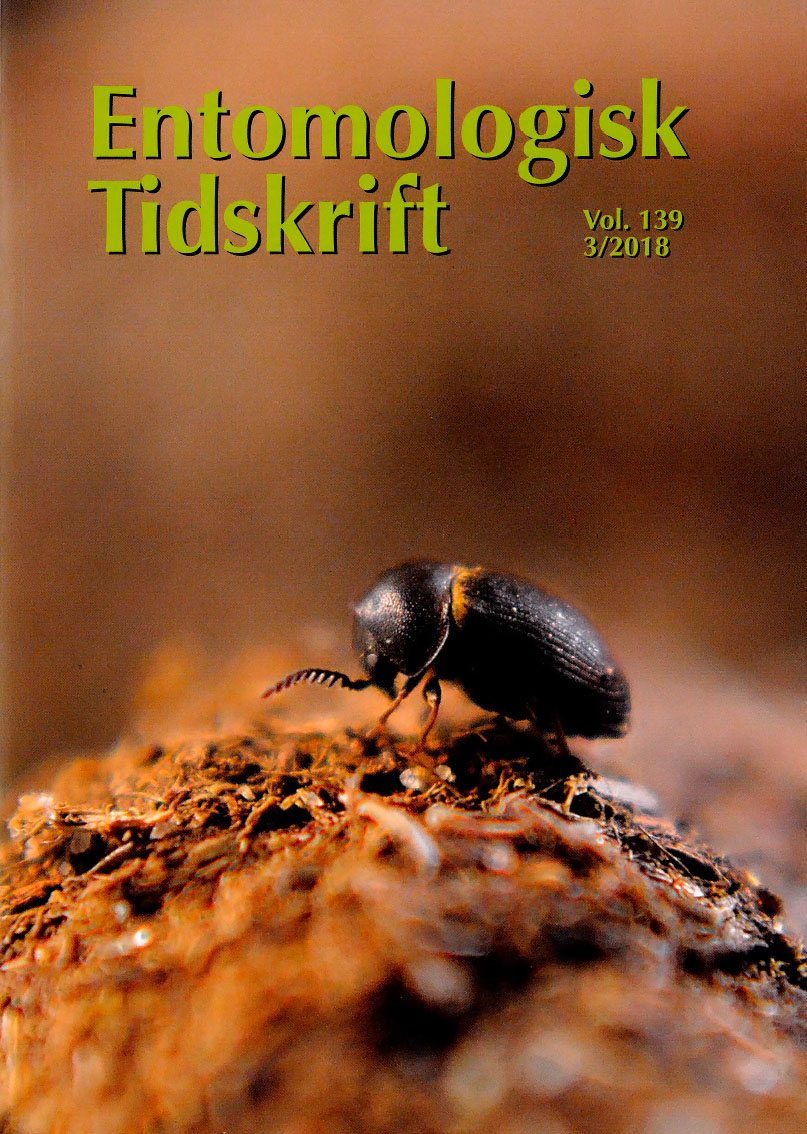Archives
-

Entomologisk Tidskrift
Vol. 145 No. 3 (2024)Entomologisk Tidskrift Vol. 145 nr. 3 2024.
Omslag: Bild av Backåkrastranden (Skåne), fyndplatsen för vitt ordensfly (Catephia alchymista). Foto: Mats Lindeborg.
-
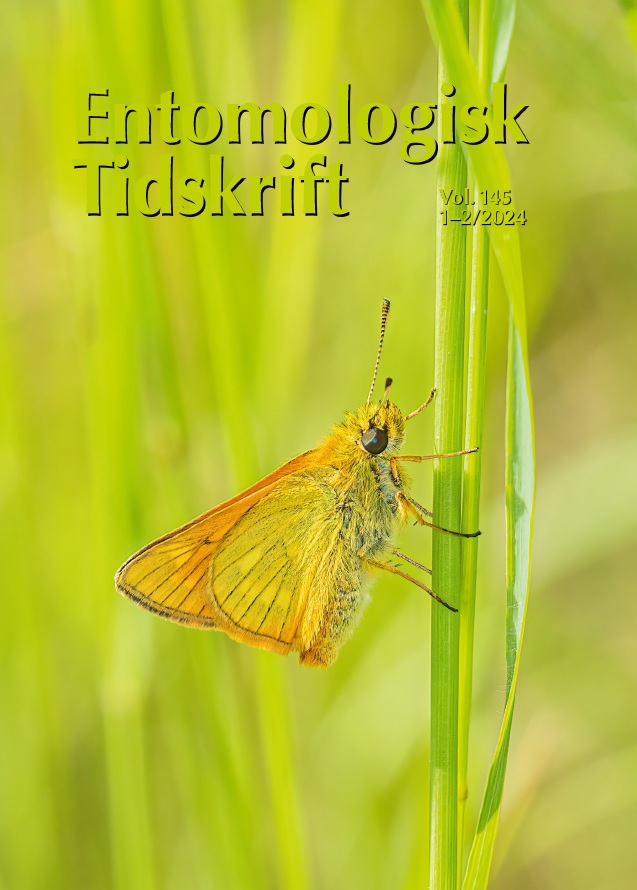
Vol. 145 No. 1-2 (2024)
Entomologisk Tidskrift 145 (1-2): 1-64.
Front cover:
A large skipper, Ochlodes sylvanus (Esper, 1788) rests on a straw of grass. Photo: Emma Wahlberg.
-
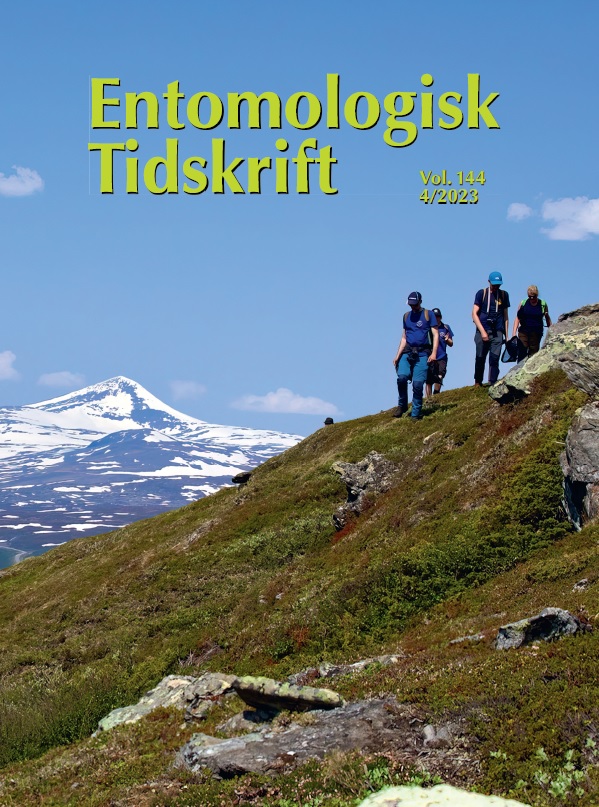
Vol. 144 No. 4 (2023)
Entomologisk Tidskrift 144 (4): 145–192.
Front cover:
During this year's entomology meeting in Arjeplog, a number of entomologists went on an excursion to the fell on Bäno. Photo: Leif Björk.
-
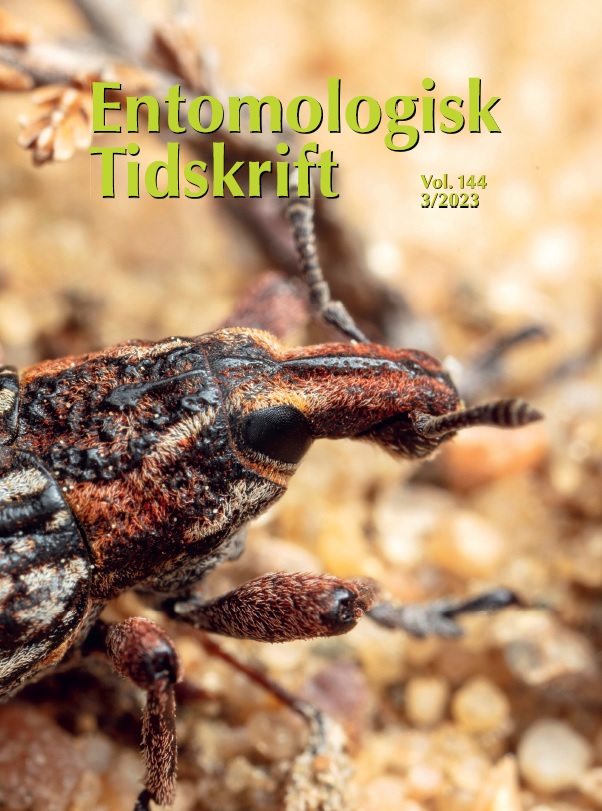
Vol. 144 No. 3 (2023)
Entomologisk Tidskrift 144 (3): 81–144.
Front cover:
Portrait of the weevil Coniocleonus nebulosus (Linnaeus, 1758), at Skillingaryds ring range. Photo: Alexander Berg. read more about this exiting rediscovery on pages 137–143.
-
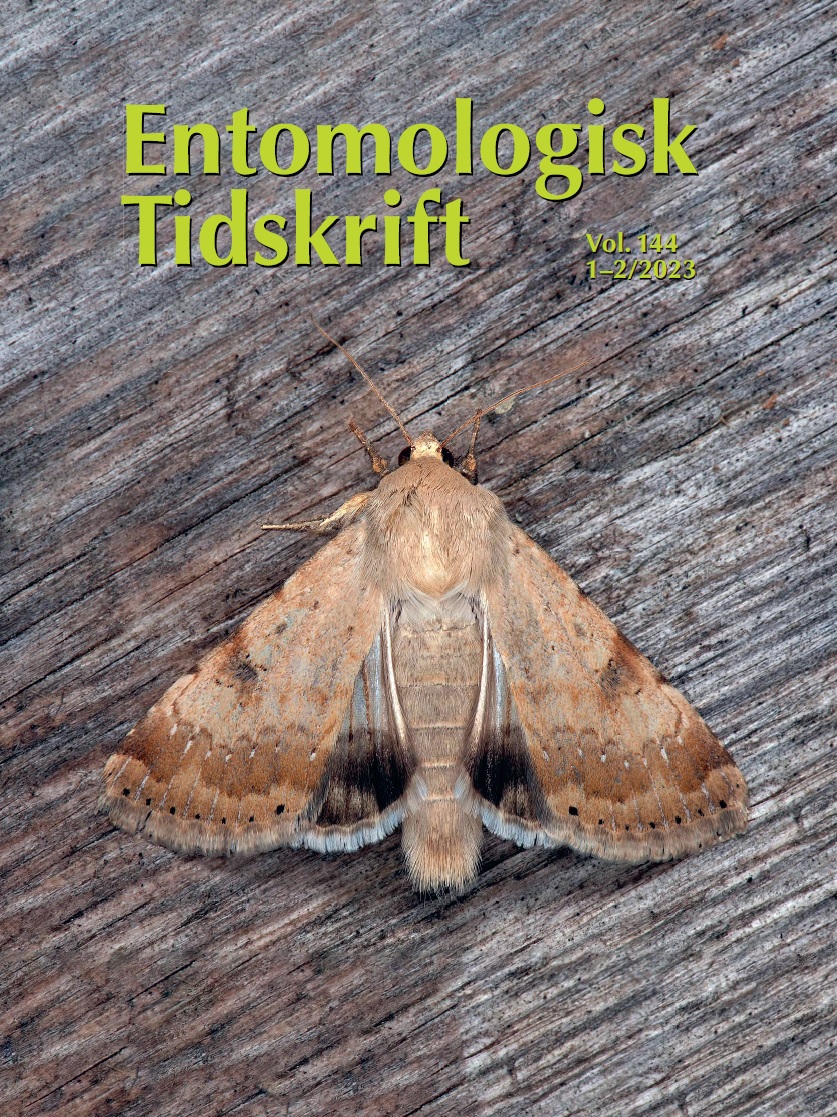
Vol. 144 No. 1-2 (2023)
Entomologisk Tidskrift 144 (1–2): 1–80.
Front cover:
Heliothis nubigera (Herrich-Schäffer, 1851), from Sweden, Öland, Ås, Enetri August 29, 2022. Photo: Håkan Johansson. This species is new for Sweden and the suggested Swedish name is "ljust knölfly".
-
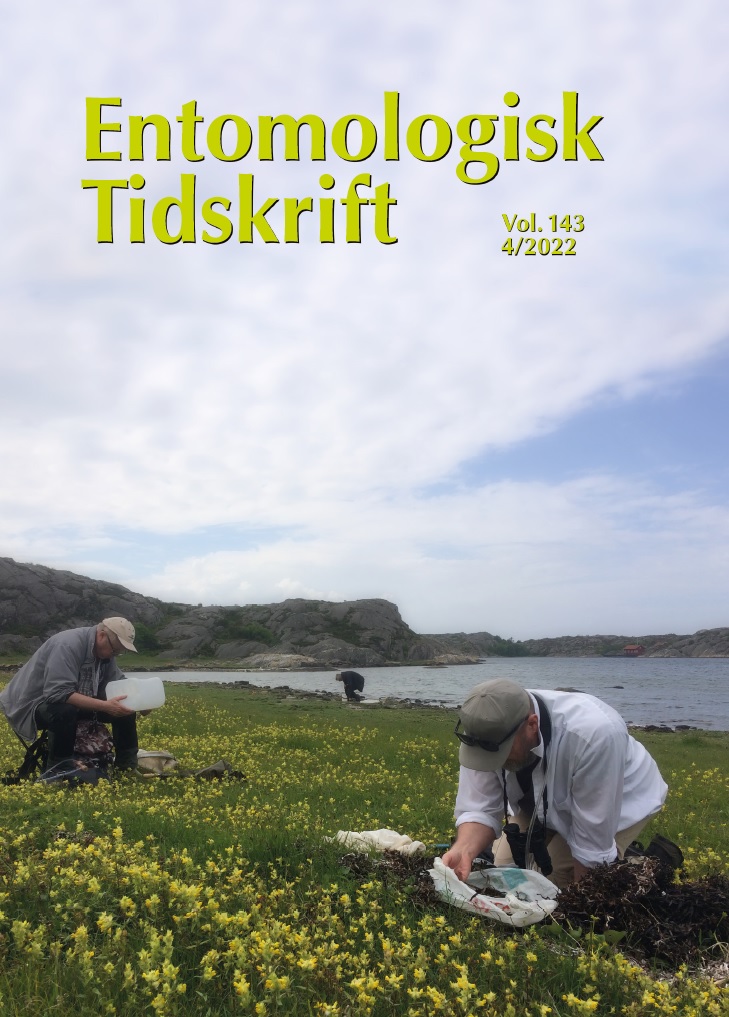
Vol. 143 No. 4 (2022)
Entomologisk Tidskrift 143 (4): 165–244.
Front cover:
It was a long-awaited physical entomology meeting in Bohuslän, with excursions to Orust and Tjörn. Photo: Oskar Gran.
-
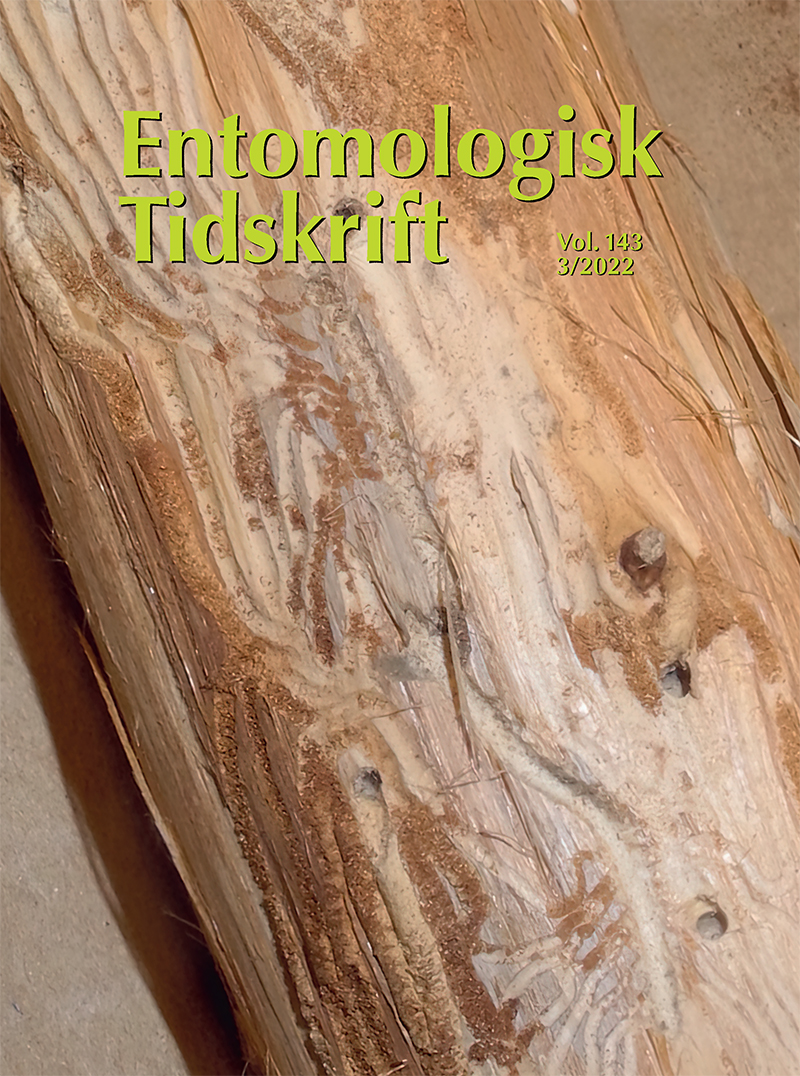
Vol. 143 No. 3 (2022)
Entomologisk Tidskrift 143 (3): 93–164.
Front cover:
Galleries of Phloeosinus thujae (Perris, 1855) (Coleoptera: Curculionidae: Scolytinae) are easy to recognize since there are no other bark beetle species known in Juniperus in Sweden – so far. Photo: Åke Lindelöw.
-
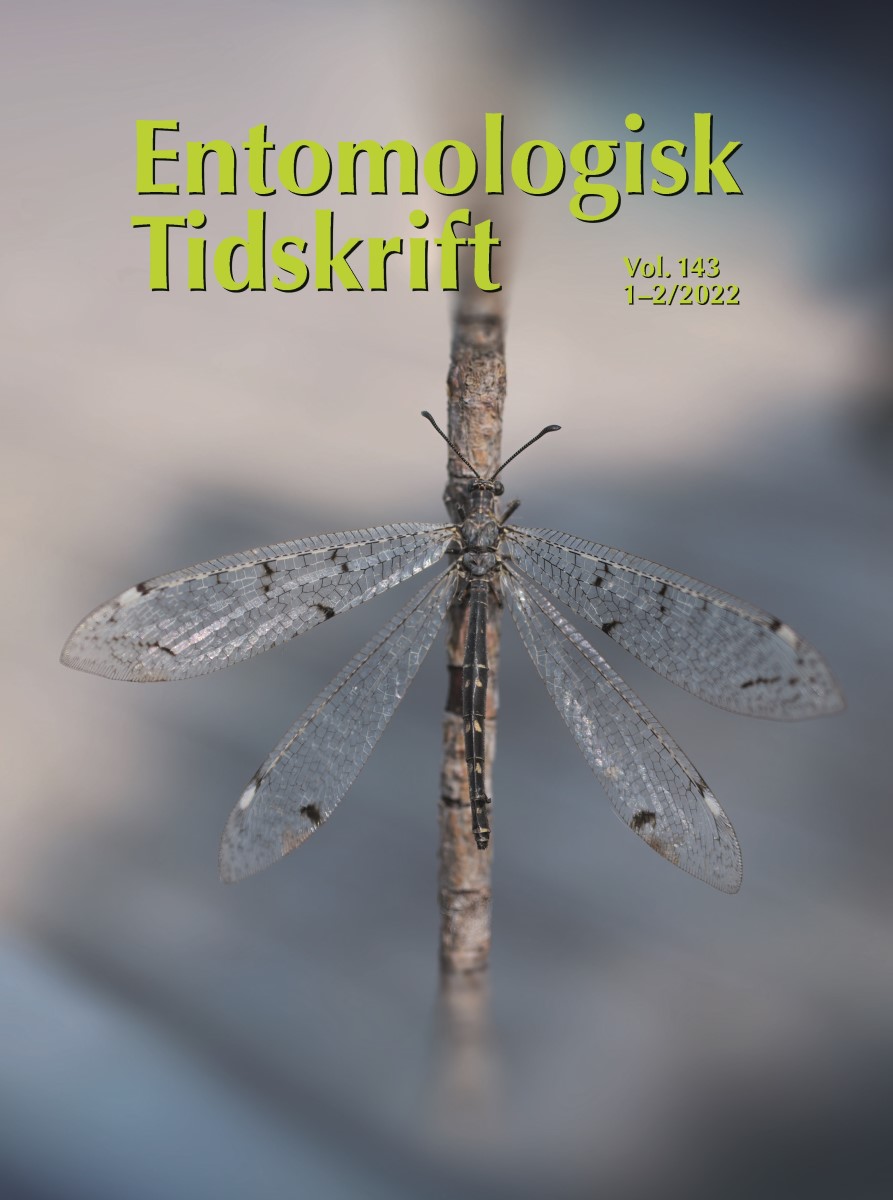
Vol. 143 No. 1-2 (2022)
Entomologisk Tidskrift 143 (1-2): 1–92.
Front cover:
The antlion Distoleon tetragrammicus (Fabricius, 1798), female, Gotland, Tofta skjutfält, Blåhäll, August 9, 2021. Photo: Håkan Elmqvist.
-
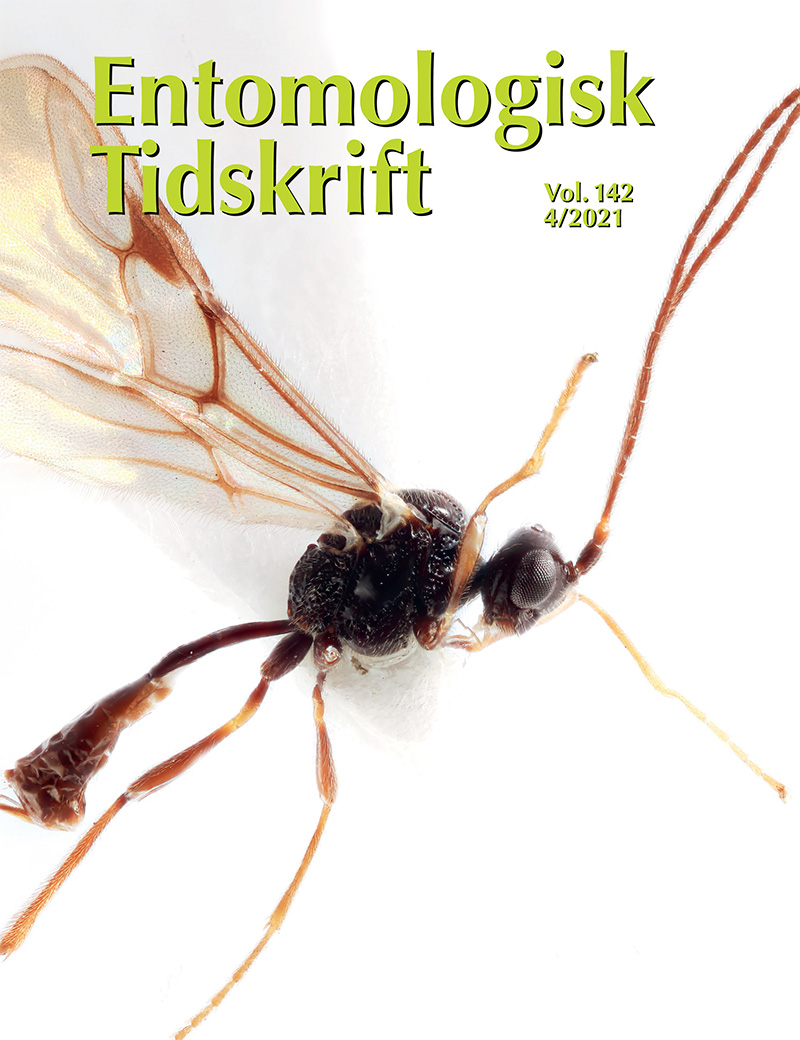
Vol. 142 No. 4 (2021)
Entomologisk Tidskrift 142 (4): 201–248
Cover photo
The braconid wasp Gretiella semirugosa (Stigenberg & Zhang, 2020) comb. nov., where the genus is named after the climate activist Greta Thunberg. Photo: Julia Stigenberg.
-
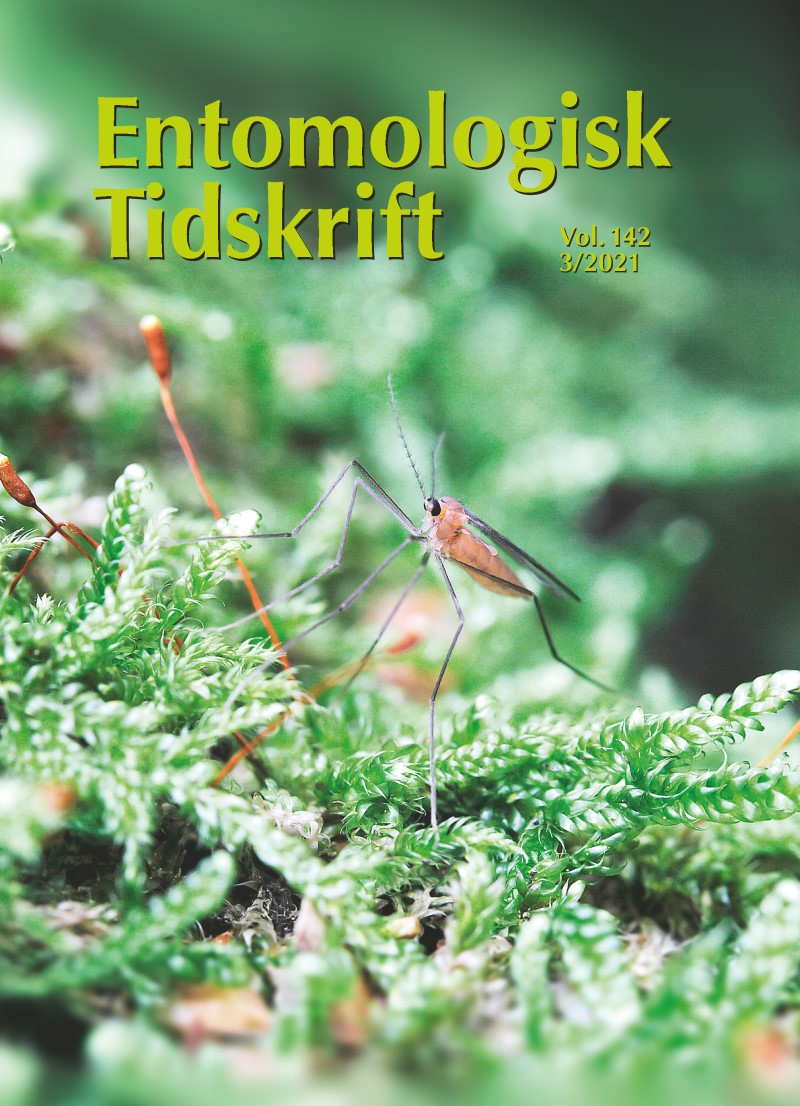
Vol. 142 No. 3 (2021)
Entomologisk Tidskrift 142 (3): 105–200
Cover photo
A female of the porricondyline Dicerura rossica (Mamaev, 1960) hiding in a jungle of moss (27 July 2009). Photo: Mathias Jaschhof.
-
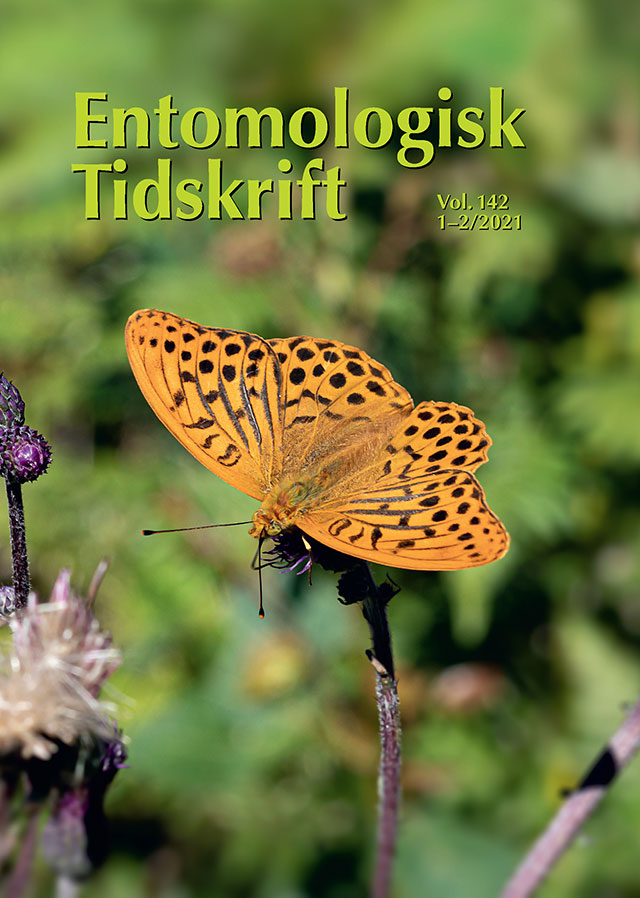
Vol. 142 No. 1-2 (2021)
Entomologisk Tidskrift 142 (1–2): 1–104
ISSN 0013-886x
Björnlunda, mars 2021Front cover
Silver-washed fritillary, Argynnis paphia (Linnaeus, 1758), in Västergötland, july 2020. Photo: Emma Wahlberg. -

Vol. 141 No. 4 (2020)
Entomologisk Tidskrift 141 (4): 129–208.
ISSN 0013-886x
Björnlunda, deember 2020Front cover
Stig Lundberg searching for the jewel beetle Buprestis splendens (Fabricius, 1775) in the Katara Pass, Greece. Photo: R. Mugerwa Pettersson, 2002. -
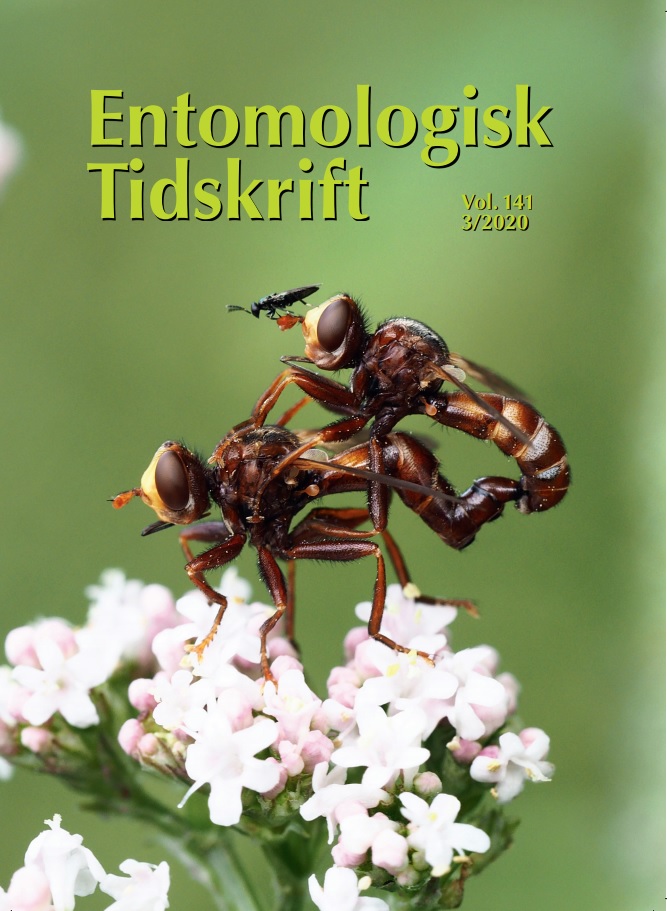
Vol. 141 No. 3 (2020)
Entomologisk Tidskrift 141 (3): 81–128.
ISSN 0013-886x
Björnlunda, juni 2020Front cover
Couple of thick-headed flies, Sicus ferrugineus (Linnaeus, 1761), in the company of a chalcid wasp (Chalcidoidea). Photo: Niklas Johansson. -
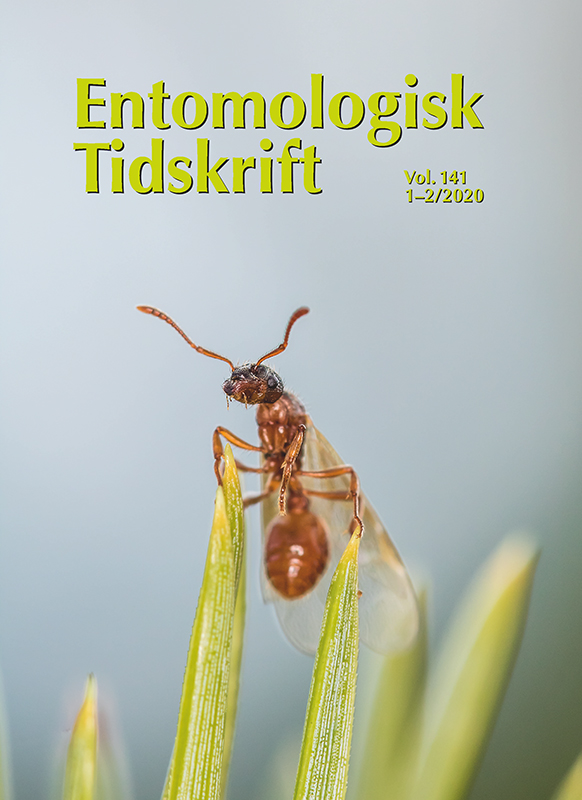
Vol. 141 No. 1-2 (2020)
Entomologisk Tidskrift 141 (1–2): 1–80.
ISSN 0013-886x
Björnlunda, april 2020Front cover
An ant (Myrmica) on high altitude. Photo: E. Wahlberg. -
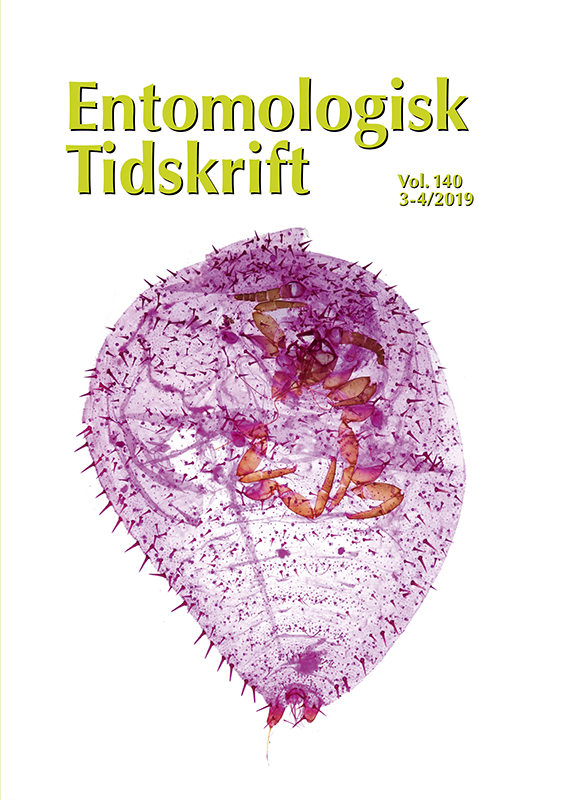
Vol. 140 No. 3-4 (2019)
Entomologisk Tidskrift 140 (3-4): 145–208
ISSN 0013-886x
Björnlunda, februari 2020Front cover
Slidemounted female of the bark scale Acanthococcus azaleae. The species belongs to the family felt scales (Eriococcidae). Read more on pages 157–165. Photo: C. Fägerström. -
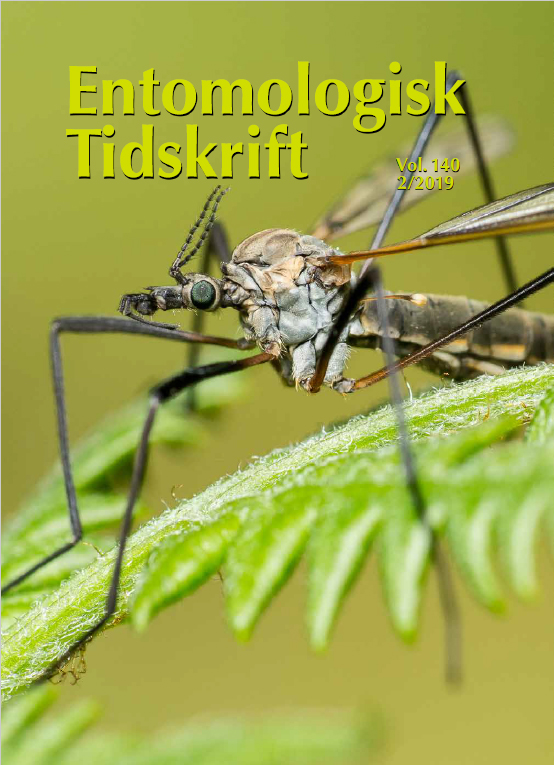
Vol. 140 No. 2 (2019)
Entomologisk Tidskrift 140 (2): 81–144
ISSN 0013-886x
Uppsala, juli 2019Front cover
The cranefly Tipula varipennis Meigen, 1818 is a mid-sized species. It can be found in damp woodlands over large parts of the country. The adult craneflies can be seen in May and June. Photo: Anders Lindström. -
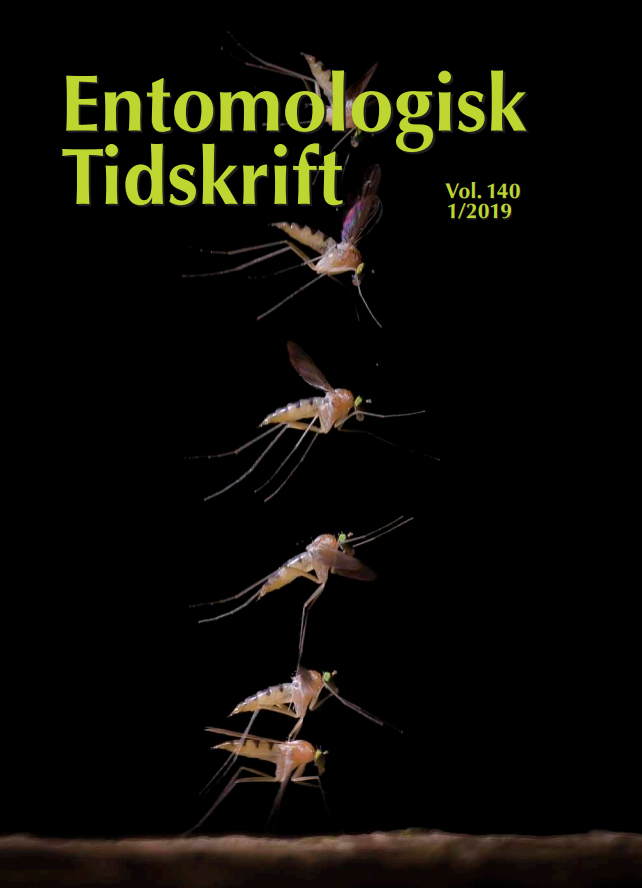
Vol. 140 No. 1 (2019)
Entomologisk Tidskrift 140 (1): 1–80
ISSN 0013-886x
Uppsala, juli 2019Front cover
Long legged (Neurigona quadrifasciata) taking off. For long this species eluded the photographer by repeatedly disappearing from the frame just before the camera shutter opened. The reason being that the fly was scared off by the pre-flash, sent out 1/10s prior to exposure. The solution was to set the flash in strobe mode (90Hz): The first strobe then triggered the flight response and during the 1/10 exposure the flash fired nine times, capturing the take off pattern of the fly in one single image. Photo: John Hallmén. -
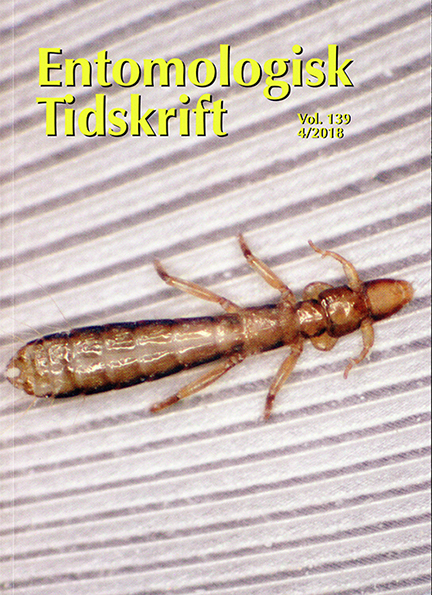
Vol. 139 No. 4 (2018)
Entomologisk Tidskrift 141 (4): 205–394.
ISSN 0013-886x
Uppsala, december 2018The head lice are not the only lice species in Sweden, but there are many more with interesting biology. The whole of Sweden's fauna of animal lice (Phtiraptera) is summarized in this book, which is based on a doctoral thesis within the Swedish Taxonomy Initiative which the main author Daniel Gustafsson has completed. There are a total of 322 species of lice in the country. They live on everything from song larks and water voles to cattle and humans. The book contains identification keys for all species. You will also find checklists on which hosts the different lice live on and vice versa - information on which species of lice can be found on different hosts. For those who want to delve further into the subject, the 473 references listed at the end are a goldmine. The majoroity of the volume is written in English.
The "louse number" can be ordered from the subscription office for SEK 200, including postage within Sweden. For the rest of the Nordic region, SEK 250 applies and outside the Nordic region SEK 290, including postage. Send orders via e-mail to pren@sef.nu.

